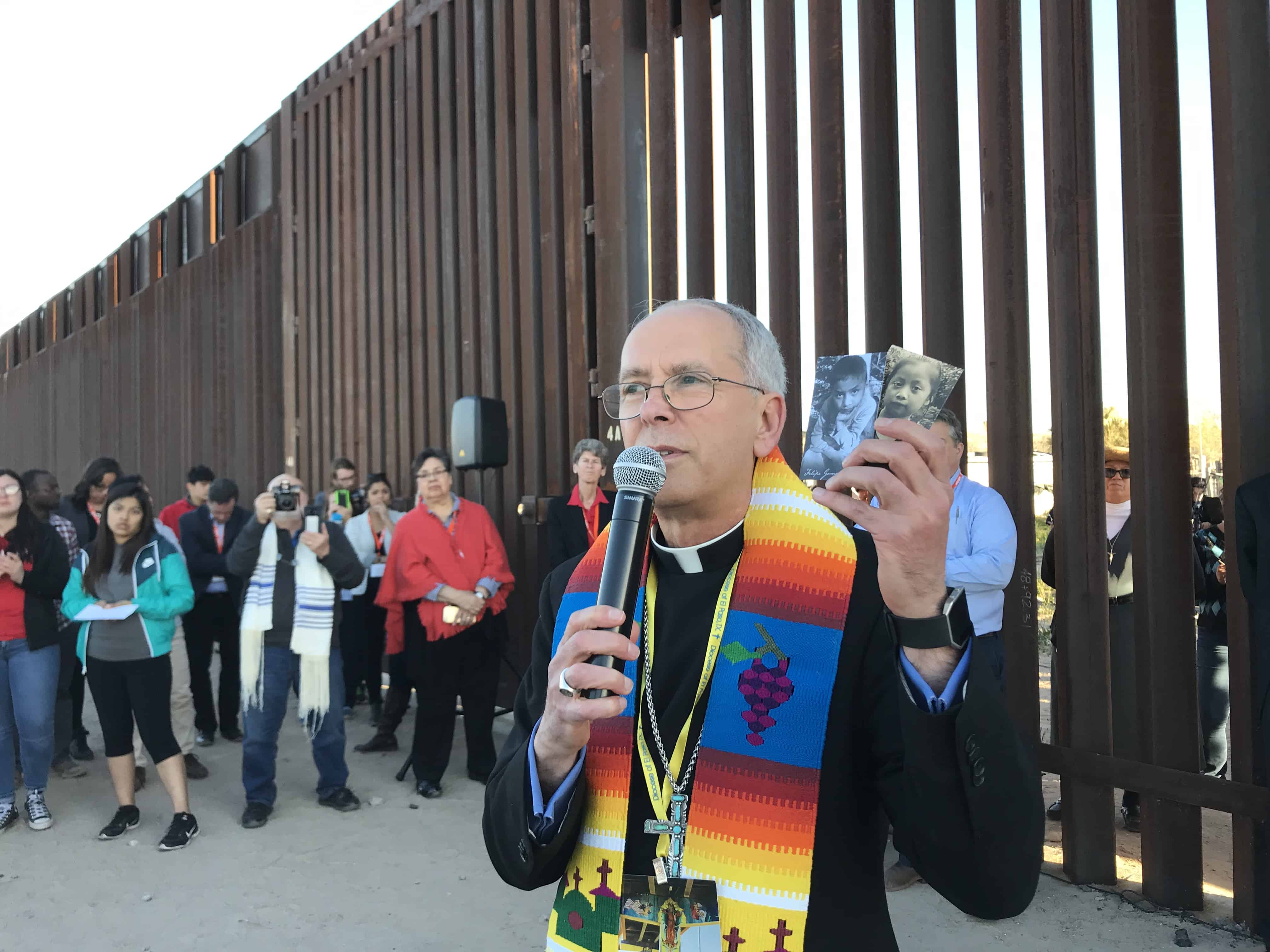[This is a response to an article written by Daniel Mascarenhas, S.J. on September 30th titled “Should A Catholic Support the Border Wall?”]
Should a Catholic support the border wall? If all we are talking about is a border wall, we are missing the main problem.
The fundamental problem on the U.S.-Mexico border is not the border wall. We already have one covering the most populated sections of the border. Ask border patrol agents: there are more pressing issues than expanding the wall.
The fundamental problem is not a border wall. It’s immigration policy: the rules that govern who can cross our border.
A common misconception from those who support a bigger, taller, longer border wall is that pro-immigration groups want the border completely removed. “Open borders,” right?? No- this is a dangerously misleading caricature. That’s not what pro-immigration groups are arguing for. Most people can agree that regulation on the border, including some form of barrier, is important and sensible. That’s why we already have one.
So if that’s the case, why all the fuss about “Build the Wall”? The reason that people have gotten so fired up about this rhetoric is not because people believe we shouldn’t have any fencing or security on the border. It’s because the mantra has become a rallying cry directed against migrants, especially Latinos. The phrase has come to mean: you are not welcome. It is used in ways that are degrading to their human dignity. And it has become the source of an acute sense of pain and fear for many members of the Latino population in the U.S., regardless of their immigration status.
Even with a wall, there are ways to be welcoming. There are ways to respect the human dignity of migrants. That’s where immigration policy comes into play.
Let me respond to Daniel Mascarenhas’s use of the metaphor of locks on doors. For your private residence, you have locks on your doors, as he points out. That’s totally sensible to protect the well-being of you and your family. If we lock the doors of our house, Mascarenhas reflects, we should regulate our border. Right?
Agreed! But keep in mind: all borders/doors are porous. They regulate passage, and often prevent it. But they also permit passage. You lock your door, but you also unlock it for all sorts of people. Friends, family, neighbors, even the Amazon delivery person.
The locks on your door are sensible. But you don’t always leave them locked.
And even with locks, people might get into your house. Let’s just say, for example, you awake one morning to find a mother and child have gotten into your house through a window, even though the door was locked. You find them huddled in the corner of your living room, hungry and scared. How would you respond?
You might ask them what they were doing (and how the heck they got in your house!). You might ask them if there is someone that you could call to help them get somewhere safe.
Would you, say, lock the child in a cage and bring the mother to a separate room for interrogation? Eesh- I suspect not.
This is obviously taking the metaphor to the extreme.1 I just use it to highlight some of the differences between having a lock on your door (= border wall) and the treatment of people who come to your house (= immigration policy). Where do you strike a balance between safety and hospitality?
The fundamental question regarding our border is: who (or what) is permitted to cross it?
Let’s start with “what” we permit to cross the border. Money, for example, is permitted to cross the border fairly easily, with some regulations. For trade, we import and export a tremendous amount of goods across the border daily, with very structured rules and tariffs. Guns and drugs are very heavily regulated, but these cross illegally anyway. Guns move south from the U.S. to Mexico, and cash and drugs make their way north into the U.S. Frankly, the wall doesn’t seem to be helping much with this.
What about people? Who is permitted to cross our border? Some people are permitted to cross our border very easily: returning citizens, people with visas, etc. We let them through without any problems. “Come on in!”
But many, many people are essentially barred from ever crossing that border. I’m not just talking about “bad hombres,” but also honest, decent hardworking men and women. Economically disadvantaged Mexicans and Central Americans have almost no way to enter the U.S. legally with documentation. None!
“Get in line!” is often a rallying cry for people who speak out against undocumented migration. What line? The fact is, for millions and millions of people, there is no line to get in. None! They are not welcome.
There is no “economically disadvantaged” visa that a poor Mexican or Central American could apply for. Shouldn’t there be? If we want people to get in line, shouldn’t we have a line for them to get in?
Daniel writes about the motives for migration, and he points to financial reasons as the most cited reason for migrating. Fair enough. Economic motives are a significant push factor driving migration. But it is dangerous to isolate the factors that drive migration, as if there are only single discrete factors that drive migrants. In so many cases, migrants are looking for economic opportunities while also fleeing situations of violence. Even if they are not directly under personal threat, their economic situation is severely worsened by the atmosphere of violence.
Whether their primary motives are economic or security-driven or some combination of both, how do they get into the country legally? One of the only ways a poor Mexican or Central American can enter the U.S. is with a valid asylum claim, which requires the threat of violence in their home country. And so, many people come to our country making these claims. Given that El Salvador, Guatemala, and Honduras consistently rank among the most violent countries in the entire world, should these claims really surprise us?
Our system does not make asylum claims easy. I met a man who was detained in Arizona for months while awaiting the trial for his asylum claim. He had voice messages of death threats against him on his cell phone because he had turned in members of a local gang to the police. “We can’t verify these,” the judge said. “Can you get us video footage of the person making these threats?”
Does the judge realize how ridiculous that request is?
Speaking of the violence in our southern neighbors, it’s also not much of a stretch to say that the U.S. has contributed to and exacerbated this problem. We blame the local governments, but we’ve influenced their elections. We exported gang members from our prison systems who have created the gangs ravaging those countries today. Our drug habits continue to fuel their underground economies, arm their gangs, and fund the violence.
“Deal with your problems at home and you won’t have to come here!” some Americans say. “You created these problems and make them worse every year!” our neighbors respond. “Let us in! Let us work! We’ll send money home to provide for our families and build for the future!”2
Yet we continue to make it extremely difficult for people to come here. Just being poor isn’t enough to get you into the U.S. Not by a long shot. There is no line. “Give me your tired, your poor, your huddled masses yearning to breathe free.” Wait, never mind, change that: “Give me your wealthy and educated, give me those who are marrying an American or spending lots of tourist dollars. There are visas for you! Come on in! (…but no one else!)”
What are our criteria for who should be permitted to cross the border? If we think it is a question of safety, we are lying to ourselves. The wealthy, educated, and connected have easy paths of entry. It’s not a matter of safety.
There are thousands of people eager to come and fill open jobs in our country. Have you noticed all the “Help Wanted” signs around these days? Good, hardworking, honest people want these jobs. The problem? They are poor. They have no money, no advanced degrees, and no connections. There is no line for them.
Could we develop better criteria for legal entry into the U.S.? Perhaps one that is guided by a Christian ethic, for example? One that welcomes the stranger and looks at a migrant with eyes of compassion?
There has to be a better way.
Daniel struggles with the tension between his head and his heart when considering how to handle our border. I don’t see the tension.
Our head tells us that regulation is necessary at the border. A border wall is sensible. Thankfully we already have one where it matters.
Our heart should tell us that the economically disadvantaged should be among those permitted to cross. In fact, our Christian faith encourages us to give them priority (the “preferential option” for the poor). They should be at the front of the line! But we haven’t even made a line for them yet.
Our head and our heart do not need to be in conflict. The solution is sensible. We do not need to invest billions in expanding the border wall into unpopulated desert regions. Instead, we need to invest in immigration policy reform that creates pathways to legal entry for those most in need. If we do that, we might just find that the wall will become obsolete.
It’s the right thing to do. It’s what we Catholics should support.
- We could also take this metaphor to another extreme and suppose that a violent criminal broke into your house. In that case, I am sure that you would call the police. And probably invest in a more complex security system going forward. The reason I chose the example that I offered is because it is more reflective of the actual profile of migrants who come to our southern border. A criminal could enter into your house, but it will almost certainly be a U.S. citizen (in this metaphor, someone with a key to your door), not a migrant. ↩
- Remittances sent from the U.S. are a main driver of local economies to our south. They outstrip international aid by an enormous margin. ↩


